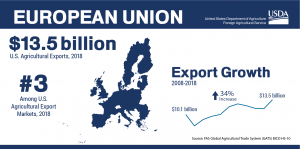Sec. Perdue Highlights EU Ag Trade Issues
Bloomberg writer Jonathan Stearns reported last week that, “Agriculture Secretary Sonny Perdue became the latest American official to face European Union complaints about U.S. threats to global trade rules and punitive tariffs on EU farm goods.
“EU agriculture ministers used a working lunch with Perdue on [January 27] in Brussels to stress the importance of upholding the World Trade Organization, whose ability to settle international commercial disputes has been hobbled by U.S. President Donald Trump’s administration.
“The ministers also expressed unhappiness about U.S. tariffs on European wine and cheese as retaliation over illegal subsidies in Europe for planemaker Airbus SE.”
Began our trip to Europe today in Belgium, with our first stop being a Belgian Blue livestock farm outside of Brussels. This very impressive family owned and operated facility produces these beautiful traditional animals. pic.twitter.com/OQI9LsO68s
— Sec. Sonny Perdue (@SecretarySonny) January 26, 2020
The Bloomberg article explained that, “The EU is seeking to revive a July 2018 trade truce with the U.S. in a bid to avert an escalation in tit-for-tat tariffs that began when Trump invoked national-security considerations to impose duties on steel and aluminum from Europe.”
The EU farm ministers signaled no willingness to meet U.S. demands to loosen the bloc’s better-safe-than-sorry approach to food safety. This stance has led to longstanding European bans on hormone-treated beef and ‘chlorinated’ chicken and to a slow approval process in Europe for genetically modified foods.
And Reuters writer Philip Blenkinsop reported last week that, “The European Union needs to redress a $10-12 billion imbalance in farm produce trade with the United States and adapt its food safety rules to reflect ‘sound science,’ the U.S. Secretary of Agriculture said on [January 27].
“@SecretarySonny Wants #Agriculture Included in any US/EU #Trade Agreement Talks.” https://t.co/VXmzgwOsyd (MP3- 1 minute). @USDA Radio.
* For additional background, see this FarmPolicyNews item from January 2019- https://t.co/4QFzZAS3aj
— Farm Policy (@FarmPolicy) January 30, 2020
“Sonny Perdue, on a five-day trip to Europe, said both Washington and Brussels were eager to reset the transatlantic relationship but that rules should be based on real risks not potential hazards.
“The U.S. trade deficit in agriculture was not logical given the EU had almost double the number of consumers as the United States and only two-thirds of the arable land, Perdue said.
Agriculture has proved a block in U.S.-EU trade talks, with Brussels resisting Washington’s demand that it be included. Perdue said tariffs on farm produce could be tackled at a later stage, but regulatory barriers need to be addressed now.
In a separate Bloomberg article last week, Jonathan Stearns reported that, “U.S. Agriculture Secretary Sonny Perdue signaled that a renewed transatlantic trade truce will require more ambitious European Union efforts to ease imports of American foods.
I look forward to working with the new EU Commissioner for Agriculture @jwojc on ways the US and EU can continue to work together to feed our growing world population pic.twitter.com/AT7pszHrkm
— Sec. Sonny Perdue (@SecretarySonny) January 27, 2020
“Perdue criticized an idea being pursued by the bloc of a piecemeal accord that would scale back European regulatory barriers to individual American products such as shellfish, saying a U.S. farm-trade deficit with the EU of $10 billion to $12 billion was ‘unsustainable and unreasonable.’

“Instead, he said, Europe should reject the ‘political science of fear’ over U.S. farm goods and ease market access for them in general.”
“Perdue described talks he held on [January 27] with EU officials in Brussels as ‘very productive.’ And, while declining to speculate about the elements of any transatlantic farm deal because it is being handled in Washington by U.S. Trade Representative Robert Lighthizer, Perdue held out the prospect of results within weeks,” the Bloomberg article said.
Source: Keith Good, University of Illinois
